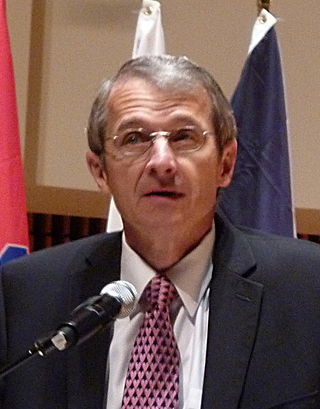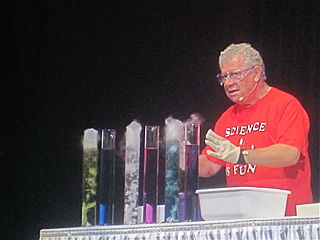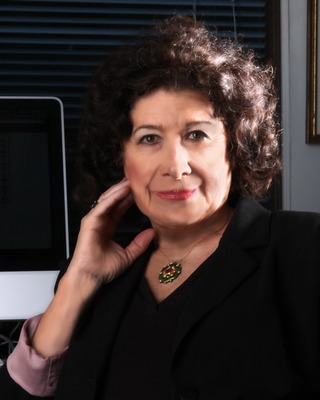Related Research Articles

The American Chemical Society (ACS) is a scientific society based in the United States that supports scientific inquiry in the field of chemistry. Founded in 1876 at New York University, the ACS currently has more than 155,000 members at all degree levels and in all fields of chemistry, chemical engineering, and related fields. It is one of the world's largest scientific societies by membership. The ACS is a 501(c)(3) non-profit organization and holds a congressional charter under Title 36 of the United States Code. Its headquarters are located in Washington, D.C., and it has a large concentration of staff in Columbus, Ohio.

Jacqueline K. Barton, is an American chemist. She worked as a Professor of Chemistry at Hunter College (1980–82), and at Columbia University (1983–89) before joining the California Institute of Technology. In 1997 she became the Arthur and Marian Hanisch Memorial Professor of Chemistry and from 2009 to 2019, the Norman Davidson Leadership Chair of the Division of Chemistry and Chemical Engineering at Caltech. She currently is the John G. Kirkwood and Arthur A. Noyes Professor of Chemistry.

Robert Howard GrubbsForMemRS was an American chemist and the Victor and Elizabeth Atkins Professor of Chemistry at the California Institute of Technology in Pasadena, California. He was a co-recipient of the 2005 Nobel Prize in Chemistry for his work on olefin metathesis.

Richard Royce Schrock is an American chemist and Nobel laureate recognized for his contributions to the olefin metathesis reaction used in organic chemistry.

Roger Adams was an American organic chemist who developed the eponymous Adams' catalyst, and helped determine the composition of natural substances such as complex vegetable oils and plant alkaloids. He isolated and identified CBD in 1940. As head of the Chemistry department at the University of Illinois from 1926 to 1954, he influenced graduate education in America, taught over 250 Ph.D. students and postgraduate students, and served in military science during World War I and World War II.

Anna Jane Harrison was an American organic chemist and a professor of chemistry at Mount Holyoke College for nearly forty years. She was the first female President of the American Chemical Society, and the recipient of twenty honorary degrees. She was nationally known for her teaching and was active nationally and internationally as a supporter of women in science.

Donna J. Nelson is an American chemist and professor of chemistry at the University of Oklahoma. Nelson specializes in organic chemistry, which she both researches and teaches. Nelson served as a science advisor to the AMC television show Breaking Bad. She was the 2016 President of the American Chemical Society (ACS) with her presidential activities focusing on and guided by communities in chemistry. Nelson's research focused on five primary topics, generally categorized in two areas, Scientific Research and America's Scientific Readiness. Within Scientific Research, Nelson's topics have been on mechanistic patterns in alkene addition reactions and on Single-Walled Carbon Nanotube (SWCNT) functionalization and analysis, yielding the first COSY NMR spectrum of covalently functionalized SWCNTs in solution. Under America's Scientific Readiness, she focuses on science education and impacting science by considering its communities; this includes classroom innovations and correcting organic chemistry textbook inaccuracies, on ethnic and gender diversity among highly ranked science departments of research universities, and on improving the image and presentation of science and scientists to the public.
Tobin Jay Marks is the Vladimir N. Ipatieff Professor of Catalytic Chemistry, Professor of Material Science and Engineering, Professor of Chemical and Biological Engineering, and Professor of Applied Physics at Northwestern University in Evanston, Illinois. Among the themes of his research are synthetic organo-f-element and early-transition metal organometallic chemistry, polymer chemistry, materials chemistry, homogeneous and heterogeneous catalysis, molecule-based photonic materials, superconductivity, metal-organic chemical vapor deposition, and biological aspects of transition metal chemistry.

Mary Lowe Good was an American inorganic chemist who worked academically, in industrial research and in government. Good contributed to the understanding of catalysts such as ruthenium which activate or speed up chemical reactions.
Carl Shipp "Speed" Marvel was an American chemist who specialized in polymer chemistry. He made important contributions to U.S. synthetic rubber program during World War II, and later worked at developing polybenzimidazoles, temperature-resistant polymers that are used in the aerospace industry, in fire-fighting equipment, and as a replacement for asbestos. He has been described as "one of the world's outstanding organic chemists" and received numerous awards, including the 1956 Priestley Medal and the 1986 National Medal of Science, presented by President Ronald Reagan.

JoAnne Stubbe is an American chemist best known for her work on ribonucleotide reductases, for which she was awarded the National Medal of Science in 2009. In 2017, she retired as a Professor of Chemistry and Biology at the Massachusetts Institute of Technology.

Bassam Z. Shakhashiri is a professor of chemistry at the University of Wisconsin-Madison, where he is the holder of the William T. Evjue Distinguished Chair. An active advocate for science education, he is the author of multiple books of chemical demonstrations. He was the 2012 president of the American Chemical Society and has received numerous awards and honors.
Kyoko Nozaki is a Japanese chemist and Professor of Chemistry at University of Tokyo in Japan.
M. Christina White is a professor of chemistry at the University of Illinois at Urbana-Champaign. Her research in the field of organometallic catalysis focuses on developing highly selective carbon–hydrogen bond activation methods to streamline the process of complex molecule synthesis.
The Melvin Mooney Distinguished Technology Award is a professional award conferred by the American Chemical Society, Rubber Division. Established in 1983, the award is named after Melvin Mooney, developer of the Mooney viscometer and of the Mooney-Rivlin hyperelastic law. The award consists of an engraved plaque and prize money. The medal honors individuals "who have exhibited exceptional technical competency by making significant and repeated contributions to rubber science and technology".

Zafra M. Lerman is an American chemist, educator, and humanitarian. She is the President of the Malta Conferences Foundation, which aims to promote peace by bringing together scientists from otherwise hostile countries to discuss science and foster international scientific and technical collaboration. From 1986 to 2010, she chaired the American Chemical Society's Subcommittee on Scientific Freedom and Human Rights. She has been successful in preventing executions, releasing prisoners of conscience from jail and bringing dissidents to freedom. She is the recipient of many awards for education and science diplomacy, including the 1999 Presidential Award from U.S. President Clinton, the 2005 Nyholm Prize for Education from the Royal Society of Chemistry (England), the 2015 Science Diplomacy Award from the American Association for the Advancement of Science (AAAS), the 2016 Andrei Sakharov Award for human rights from the American Physical Society (APS), the 2016 United Nations NOVUS Award for the 16th Sustainable Development Goal: Peace and Justice, and the 2017 International Union of Pure and Applied Chemistry Distinguished Women in Chemistry or Chemical Engineering Award.

Catherine T. Hunt is an American chemist. In 2007, she served as the president of the American Chemical Society (ACS). She was a director at Dow Chemical Company.

Nancy Beth Jackson was an American chemist. She has done energy research on heterogeneous catalysis and the development of alternative fuels. She also worked in the field of chemical nonproliferation, educating chemical professionals on the importance of safe and secure chemical practice in research, teaching and business, in an effort to prevent the misuse of chemicals as "weapons, poisons, explosives or environmental pollutants". She was the first implementer in developing the international Chemical Security Engagement Program. She was active in promoting diversity in STEM fields. She was president of the American Chemical Society in 2011, leading the organization during the International Year of Chemistry. In 2012, she was honored with the AAAS Award for Science Diplomacy.

Diane Grob Schmidt is an American chemist, who was the Executive at Procter & Gamble Co. in Cincinnati, Ohio from 1981 to 2014. In 2015, she served as president of the American Chemical Society (ACS). As of 2022, she was serving as the Chair of the Board of Visitors for the Department of Chemistry at the University of Tennessee, Knoxville.
Jin-Quan Yu is a Chinese-born American chemist. He is the Frank and Bertha Hupp Professor of Chemistry at Scripps Research, where he also holds the Bristol Myers Squibb Endowed Chair in Chemistry. He is a 2016 recipient of the MacArthur Fellowship, and is a member of the American Academy of Arts and Sciences, American Association for the Advancement of Science, and the Royal Society of Chemistry. Yu is a leader in the development of C–H bond activation reactions in organic chemistry, and has reported many C–H activation reactions that could be applicable towards the synthesis of drug molecules and other biologically active compounds. He also co-founded Vividion Therapeutics in 2016 with fellow Scripps chemists Benjamin Cravatt and Phil Baran, and is a member of the scientific advisory board of Chemveda Life Sciences.
References
- 1 2 3 4 "Dr. Marinda Li Wu". Sino-American Pharmaceutical Professionals Association (SAPA) - Greater Philadelphia. Retrieved 4 December 2015.
- 1 2 "Illinois Chemists Named American Chemical Society Fellows". The Department of Chemistry at the University of Illinois. 2015. Retrieved 4 December 2015.
- ↑ "Marinda Li Wu (PhD, 1976) 2012 University of Illinois Convocation Speech" (PDF). University of Illinois. Retrieved 4 December 2015.
- ↑ "Marinda Li Wu, Science is Fun!". Marinda Li Wu Website. Retrieved 4 December 2015.
- ↑ "ACS Elections Candidates' Election Statements And Backgrounds". Chemical & Engineering News. 89 (37): 30–42. September 12, 2011. doi:10.1021/cen-v089n037.p030 . Retrieved 4 December 2015.
- 1 2 3 Coyle, Joan (February 8, 2013). "Marinda Li Wu becomes 2013 President of World's Largest Scientific Society". ACS News. American Chemical Society. Retrieved 4 December 2015.
- ↑ Fancher, Lou (January 19, 2012). "Marinda Wu a scientific ambassador in more ways than one". Contra Costa Times. Retrieved 4 December 2015.
- ↑ "ACS President Dr. Marinda Li Wu Joins Advisory Board". Catalyst for Success. April 19, 2013. Retrieved 4 December 2015.